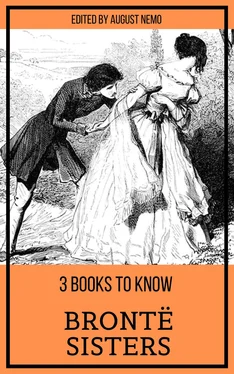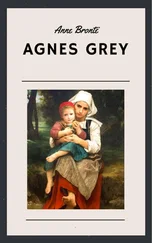‘Ah, Huntingdon!’ said she reproachfully, pausing where I had stood with him the night before—‘it was here you kissed that woman!’ she looked back into the leafy shade. Advancing thence, he answered, with a careless laugh,—
‘Well, dearest, I couldn’t help it. You know I must keep straight with her as long as I can. Haven’t I seen you kiss your dolt of a husband scores of times?—and do I ever complain?’
‘But tell me, don’t you love her still—a little?’ said she, placing her hand on his arm, looking earnestly in his face—for I could see them, plainly, the moon shining full upon them from between the branches of the tree that sheltered me.
‘Not one bit, by all that’s sacred!’ he replied, kissing her glowing cheek.
‘Good heavens, I must be gone!’ cried she, suddenly breaking from him, and away she flew.
There he stood before me; but I had not strength to confront him now: my tongue cleaved to the roof of my mouth; I was well-nigh sinking to the earth, and I almost wondered he did not hear the beating of my heart above the low sighing of the wind and the fitful rustle of the falling leaves. My senses seemed to fail me, but still I saw his shadowy form pass before me, and through the rushing sound in my ears I distinctly heard him say, as he stood looking up the lawn,—‘There goes the fool! Run, Annabella, run! There—in with you! Ah,—he didn’t see! That’s right, Grimsby, keep him back!’ And even his low laugh reached me as he walked away.
‘God help me now!’ I murmured, sinking on my knees among the damp weeds and brushwood that surrounded me, and looking up at the moonlit sky, through the scant foliage above. It seemed all dim and quivering now to my darkened sight. My burning, bursting heart strove to pour forth its agony to God, but could not frame its anguish into prayer; until a gust of wind swept over me, which, while it scattered the dead leaves, like blighted hopes, around, cooled my forehead, and seemed a little to revive my sinking frame. Then, while I lifted up my soul in speechless, earnest supplication, some heavenly influence seemed to strengthen me within: I breathed more freely; my vision cleared; I saw distinctly the pure moon shining on, and the light clouds skimming the clear, dark sky; and then I saw the eternal stars twinkling down upon me; I knew their God was mine, and He was strong to save and swift to hear. ‘I will never leave thee, nor forsake thee,’ seemed whispered from above their myriad orbs. No, no; I felt He would not leave me comfortless: in spite of earth and hell I should have strength for all my trials, and win a glorious rest at last!
Refreshed, invigorated, if not composed, I rose and returned to the house. Much of my new-born strength and courage forsook me, I confess, as I entered it, and shut out the fresh wind and the glorious sky: everything I saw and heard seemed to sicken my heart—the hall, the lamp, the staircase, the doors of the different apartments, the social sound of talk and laughter from the drawing-room. How could I bear my future life! In this house, among those people—oh, how could I endure to live! John just then entered the hall, and seeing me, told me he had been sent in search of me, adding that he had taken in the tea, and master wished to know if I were coming.
‘Ask Mrs. Hattersley to be so kind as to make the tea, John,’ said I. ‘Say I am not well to-night, and wish to be excused.’
I retired into the large, empty dining-room, where all was silence and darkness, but for the soft sighing of the wind without, and the faint gleam of moonlight that pierced the blinds and curtains; and there I walked rapidly up and down, thinking of my bitter thoughts alone. How different was this from the evening of yesterday! That, it seems, was the last expiring flash of my life’s happiness. Poor, blinded fool that I was to be so happy! I could now see the reason of Arthur’s strange reception of me in the shrubbery; the burst of kindness was for his paramour, the start of horror for his wife. Now, too, I could better understand the conversation between Hattersley and Grimsby; it was doubtless of his love for her they spoke, not for me.
I heard the drawing-room door open: a light quick step came out of the ante-room, crossed the hall, and ascended the stairs. It was Milicent, poor Milicent, gone to see how I was—no one else cared for me; but she still was kind. I shed no tears before, but now they came, fast and free. Thus she did me good, without approaching me. Disappointed in her search, I heard her come down, more slowly than she had ascended. Would she come in there, and find me out? No, she turned in the opposite direction and re-entered the drawing-room. I was glad, for I knew not how to meet her, or what to say. I wanted no confidante in my distress. I deserved none, and I wanted none. I had taken the burden upon myself; let me bear it alone.
As the usual hour of retirement approached I dried my eyes, and tried to clear my voice and calm my mind. I must see Arthur to-night, and speak to him; but I would do it calmly: there should be no scene—nothing to complain or to boast of to his companions—nothing to laugh at with his lady-love. When the company were retiring to their chambers I gently opened the door, and just as he passed, beckoned him in.
‘What’s to do with you, Helen?’ said he. ‘Why couldn’t you come to make tea for us? and what the deuce are you here for, in the dark? What ails you, young woman: you look like a ghost!’ he continued, surveying me by the light of his candle.
‘No matter,’ I answered, ‘to you; you have no longer any regard for me it appears; and I have no longer any for you.’
‘Hal-lo! what the devil is this?’ he muttered. ‘I would leave you to-morrow,’ continued I, ‘and never again come under this roof, but for my child’—I paused a moment to steady, my voice.
‘What in the devil’s name is this, Helen?’ cried he. ‘What can you be driving at?’
‘You know perfectly well. Let us waste no time in useless explanation, but tell me, will you—?’
He vehemently swore he knew nothing about it, and insisted upon hearing what poisonous old woman had been blackening his name, and what infamous lies I had been fool enough to believe.
‘Spare yourself the trouble of forswearing yourself and racking your brains to stifle truth with falsehood,’ I coldly replied. ‘I have trusted to the testimony of no third person. I was in the shrubbery this evening, and I saw and heard for myself.’
This was enough. He uttered a suppressed exclamation of consternation and dismay, and muttering, ‘I shall catch it now!’ set down his candle on the nearest chair, and rearing his back against the wall, stood confronting me with folded arms.
‘Well, what then?’ said he, with the calm insolence of mingled shamelessness and desperation.
‘Only this,’ returned I; ‘will you let me take our child and what remains of my fortune, and go?’
‘Go where?’
‘Anywhere, where he will be safe from your contaminating influence, and I shall be delivered from your presence, and you from mine.’
‘No.’
‘Will you let me have the child then, without the money?’
‘No, nor yourself without the child. Do you think I’m going to be made the talk of the country for your fastidious caprices?’
‘Then I must stay here, to be hated and despised. But henceforth we are husband and wife only in the name.’
‘Very good.’
‘I am your child’s mother, and your housekeeper, nothing more. So you need not trouble yourself any longer to feign the love you cannot feel: I will exact no more heartless caresses from you, nor offer nor endure them either. I will not be mocked with the empty husk of conjugal endearments, when you have given the substance to another!’
Читать дальше











